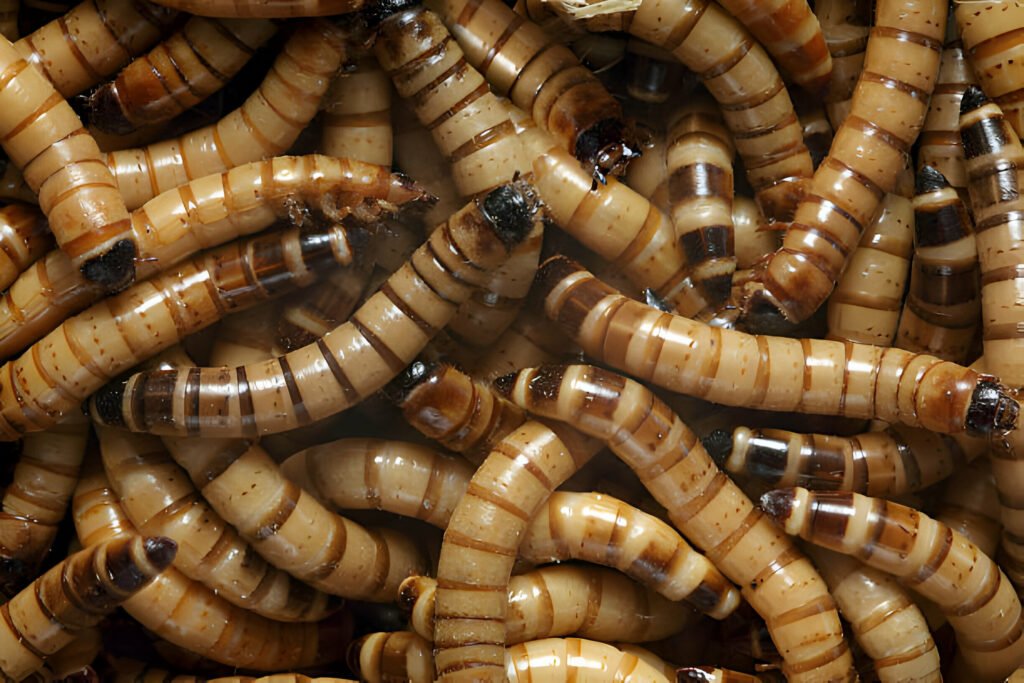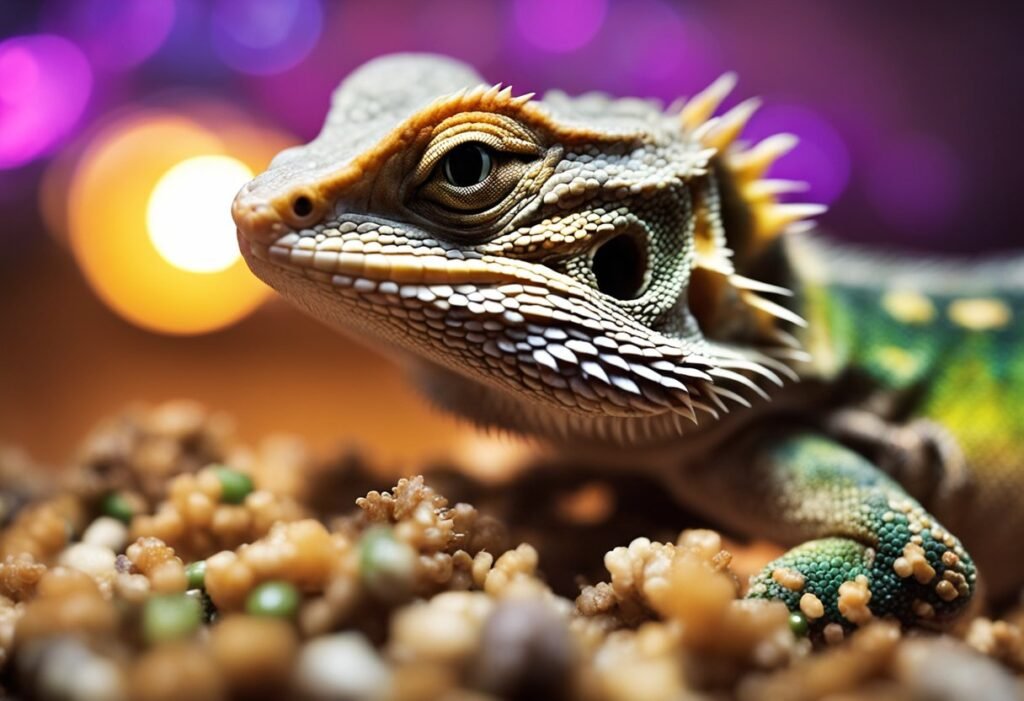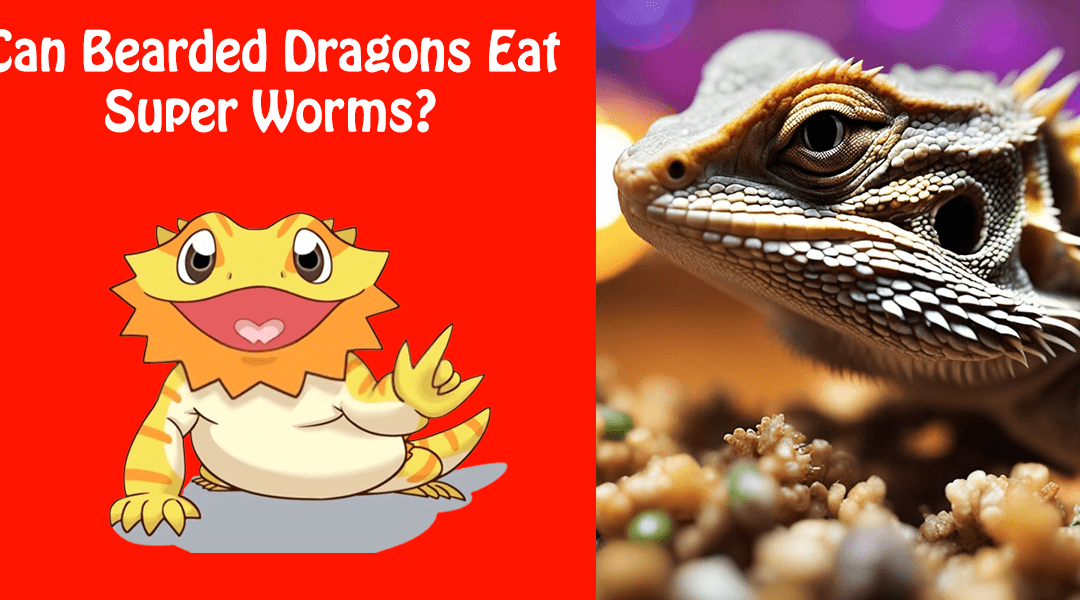Bearded dragons are fascinating creatures that make great pets. As responsible pet owners, we want to ensure that our bearded dragons are getting a balanced and nutritious diet. One question that often comes up is whether or not bearded dragons can eat super worms.
Super worms, also known as king worms, are a popular feeder insect for many reptiles. They are high in protein and fat, making them a good choice for bearded dragons. However, it is important to understand the potential risks associated with feeding super worms to your bearded dragon. In this article, we will explore whether or not bearded dragons can safely eat super worms and what precautions you should take if you choose to feed them to your pet.
Bearded Dragon Dietary Basics

As responsible pet owners, it’s important to understand the dietary needs of our bearded dragons. A balanced diet is essential for their health and well-being. In this section, we’ll cover the basics of what a bearded dragon’s diet should consist of.
Nutritional Needs
Bearded dragons are omnivores, which means they require a combination of both plant and animal-based foods in their diet. The following table outlines the essential nutrients that a bearded dragon needs and where they can be found:
| Nutrient | Function | Found in |
|---|---|---|
| Protein | Growth, maintenance, and repair of tissues | Insects, meat, and plant-based protein |
| Calcium | Bone and shell development, muscle function, and nerve transmission | Dark leafy greens, calcium supplements |
| Vitamin D3 | Calcium absorption | UVB lighting, supplements |
| Vitamin A | Vision, immune system, and skin health | Dark leafy greens, orange and yellow vegetables |
It’s important to note that bearded dragons require a higher ratio of calcium to phosphorus in their diet. A diet that is too high in phosphorus can lead to metabolic bone disease.
Feeding Schedule
Bearded dragons should be fed a variety of foods to ensure they are getting all the nutrients they need. Juvenile bearded dragons should be fed more frequently than adults, as they require more protein for growth. Here is a general feeding schedule:
| Age | Feeding Frequency | Food |
|---|---|---|
| 0-3 months | 3-4 times per day | Small crickets, small mealworms, finely chopped greens |
| 3-6 months | 2-3 times per day | Medium crickets, small super worms, finely chopped greens |
| 6-12 months | Once per day | Large crickets, medium super worms, finely chopped greens |
| 12+ months | Every other day | Large crickets, large super worms, finely chopped greens |
It’s important to monitor your bearded dragon’s weight and adjust their feeding schedule accordingly. Overfeeding can lead to obesity and other health problems.
In summary, a balanced diet consisting of a variety of plant and animal-based foods is essential for the health of your bearded dragon. By following a feeding schedule and ensuring they are getting all the essential nutrients, you can help your bearded dragon live a long and healthy life.
Understanding Superworms

Superworms are a popular feeder insect for many reptiles, including bearded dragons. In this section, we will provide an overview of what superworms are and their nutritional profile.
What Are Superworms?
Superworms, also known as kingworms or Zophobas morio, are the larvae of a darkling beetle species. They are native to Central and South America but are now widely bred for use as feeder insects. Superworms are larger than mealworms, another popular feeder insect, and can grow up to 2 inches in length.
Superworms have a hard exoskeleton and a soft, plump body. They are tan or brown in color and have six small legs at the front of their body. Superworms are also known for their ability to curl up into a tight ball when threatened.
Nutritional Profile
Superworms are a good source of protein and fat, making them a nutritious food for bearded dragons. They have a higher fat content than mealworms, which can be beneficial for bearded dragons that need to gain weight.
Here is a breakdown of the nutritional profile of superworms per 100 grams:
- Protein: 20 grams
- Fat: 13 grams
- Fiber: 5 grams
- Calcium: 100 milligrams
- Phosphorus: 250 milligrams
It is important to note that superworms should not be the sole source of nutrition for bearded dragons. They should be fed as part of a balanced diet that includes a variety of feeder insects, vegetables, and fruits.
Overall, superworms can be a nutritious and tasty addition to a bearded dragon’s diet when fed in moderation.
Benefits of Superworms for Bearded Dragons
Superworms are a popular feeder insect for bearded dragons, and for good reason. They offer a number of benefits that make them a great addition to a bearded dragon’s diet. Here are some of the key benefits of feeding superworms to your bearded dragon:
High in Protein
Superworms are a great source of protein, which is essential for bearded dragons to grow and maintain their body weight. In fact, superworms contain even more protein than crickets, which are another popular feeder insect for bearded dragons. This makes superworms a great choice for bearded dragons that need to put on weight or maintain their muscle mass.
Easy to Digest
Superworms are also easy for bearded dragons to digest, which is important for their overall health. Unlike some other feeder insects, superworms have a soft exoskeleton that can be easily broken down by the bearded dragon’s digestive system. This means that they are less likely to cause digestive issues or blockages, which can be a serious problem for bearded dragons.
Nutrient-Rich
Superworms are also a good source of vitamins and minerals that are important for bearded dragons. They are particularly high in calcium, which is essential for strong bones and overall health. They also contain other important nutrients, such as iron, potassium, and magnesium, which can help to support a bearded dragon’s immune system and overall well-being.
Versatile
Finally, superworms are a versatile feeder insect that can be used in a variety of ways. They can be fed live or dried, and can be mixed with other feeder insects to provide a varied diet for your bearded dragon. They can also be dusted with calcium or other supplements to provide additional nutrition.
Overall, superworms are a great choice for bearded dragons due to their high protein content, easy digestibility, nutrient-rich profile, and versatility. Just be sure to feed them in moderation, and always provide fresh water and a balanced diet to ensure your bearded dragon stays healthy and happy.
Risks and Considerations

When considering feeding super worms to your bearded dragon, there are several risks and considerations to keep in mind. Here are some important factors to consider before adding this food to your pet’s diet.
Choking Hazard
Super worms are larger than other insects commonly fed to bearded dragons, which means there is a higher risk of choking. It is important to ensure that the super worms are an appropriate size for your bearded dragon and that they are not fed too quickly. We recommend supervising your pet while they eat and cutting the worms into smaller pieces if necessary.
Impaction Risk
Bearded dragons are prone to impaction, which is a blockage in their digestive tract that can be caused by ingesting foreign objects or food that is too large. Super worms have a tough exoskeleton that can be difficult to digest, and feeding too many can increase the risk of impaction. We recommend limiting the number of super worms your bearded dragon eats and ensuring that they have access to plenty of water.
Nutritional Imbalance
While super worms are a good source of protein, they are not a complete diet for bearded dragons. Feeding too many super worms can lead to a nutritional imbalance, as they are high in fat and low in calcium. We recommend using super worms as a supplement to a varied diet that includes other insects, vegetables, and fruits.
In summary, while super worms can be a nutritious addition to your bearded dragon’s diet, it is important to consider the risks and limitations. By taking these factors into account, you can ensure that your pet stays healthy and happy.
Proper Feeding Techniques
Size and Quantity
When feeding super worms to bearded dragons, it is important to consider the size and quantity of the worms. Super worms are high in fat and should be fed in moderation to avoid obesity and other health issues. We recommend feeding super worms as a treat rather than a staple food source.
The size of the super worms should also be appropriate for the size of the bearded dragon. Baby bearded dragons should be fed smaller super worms, while adult bearded dragons can handle larger ones. As a general rule, the size of the super worm should not exceed the width of the bearded dragon’s head.
Live Feeding Tips
Live feeding can be a great way to provide enrichment for your bearded dragon, but it is important to do it safely. We recommend feeding super worms in a separate container to avoid accidental ingestion of substrate or other foreign objects.
It is also important to supervise your bearded dragon while it is eating to ensure that it does not choke or suffer from impaction. If your bearded dragon is a voracious eater, you may want to consider feeding it smaller quantities more frequently to avoid overeating.
In addition, we recommend dusting the super worms with a calcium supplement before feeding to ensure that your bearded dragon is getting the necessary nutrients for healthy growth and development.
Overall, super worms can be a tasty treat for your bearded dragon when fed in moderation and with proper care. By following these feeding techniques, you can ensure that your bearded dragon stays healthy and happy.
Preparing Superworms for Feeding
When it comes to feeding our bearded dragons, it’s important to provide them with a balanced diet that includes a variety of insects. Superworms are a popular choice among bearded dragon owners, but it’s important to properly prepare them before feeding them to our pets.
Gut Loading
Before feeding superworms to our bearded dragons, we need to make sure they are well-fed and nutritious. This process is known as gut loading. We can do this by feeding them a nutritious diet of fruits, vegetables, and grains for at least 24 hours before feeding them to our pets. This ensures that our bearded dragons are getting the most out of their meal and receiving the necessary nutrients.
Dusting with Supplements
In addition to gut loading, we also need to make sure our superworms are dusted with supplements before feeding them to our bearded dragons. We can use calcium and vitamin supplements to help provide our pets with the necessary nutrients they need to stay healthy.
To do this, we can place our superworms in a plastic bag with a small amount of the supplement powder and shake it gently until they are coated. We can then feed them to our bearded dragons.
By properly preparing our superworms through gut loading and dusting with supplements, we can ensure that our bearded dragons are receiving a nutritious and balanced diet.
Alternatives to Superworms

If you are looking for alternative food options for your bearded dragon, there are several options available that can provide a balanced diet. Here are a few alternatives to superworms that you can consider.
Safer Insect Options
While superworms are considered safe for bearded dragons, some owners prefer to feed their pets with insects that are less likely to cause impaction. Here are some safer insect options:
- Crickets: Crickets are a popular choice for bearded dragons. They are high in protein and low in fat, making them a nutritious option. Be sure to gut-load crickets with vegetables and fruits before feeding them to your pet.
- Dubia Roaches: Dubia roaches are another excellent option. They are low in fat and high in protein, making them a nutritious choice for your pet. They are also less likely to cause impaction than superworms.
- Mealworms: Mealworms are a good source of protein, but they should be fed in moderation as they are high in fat. Be sure to gut-load mealworms with vegetables and fruits before feeding them to your pet.
Vegetable and Fruit Alternatives
Bearded dragons are omnivores and require a balanced diet of both insects and vegetables/fruits. Here are some vegetable and fruit alternatives to superworms:
- Collard Greens: Collard greens are a good source of calcium and vitamin A. They are also low in oxalates, which can interfere with calcium absorption.
- Butternut Squash: Butternut squash is a good source of vitamin A and fiber. It is also low in oxalates.
- Blueberries: Blueberries are a good source of antioxidants and vitamin C. They are also low in sugar compared to other fruits.
In conclusion, while superworms are a popular food option for bearded dragons, there are several alternatives available that can provide a balanced diet. By incorporating a variety of insects, vegetables, and fruits into your pet’s diet, you can ensure that they receive the necessary nutrients to maintain good health.
Frequently Asked Questions
How often should superworms be included in a bearded dragon’s diet?
Superworms can be a part of a bearded dragon’s diet, but they should not be the only food source. We recommend feeding superworms as a treat, no more than once or twice a week. It is important to provide a varied diet to ensure your bearded dragon receives all the necessary nutrients.
What are the best types of worms to feed to bearded dragons?
There are several types of worms that can be fed to bearded dragons, including crickets, mealworms, and superworms. Each type has its own nutritional benefits and drawbacks. We recommend offering a variety of worms to ensure your bearded dragon receives a balanced diet.
What is the recommended number of superworms for a bearded dragon per feeding?
The number of superworms to feed a bearded dragon per feeding depends on the age and size of the dragon. Generally, adult bearded dragons can eat up to 10 superworms per feeding, while younger dragons should be fed fewer. It is important to monitor your bearded dragon’s weight and adjust the amount of food accordingly.
Are superworms suitable for baby and juvenile bearded dragons?
Superworms are not recommended for baby and juvenile bearded dragons as they can be difficult to digest and may cause impaction. It is best to feed younger dragons smaller, more frequent meals of appropriately sized insects.
Is it better to feed bearded dragons superworms or crickets?
Both superworms and crickets can be a part of a bearded dragon’s diet, and each has its own nutritional benefits. It is important to offer a variety of insects to ensure your bearded dragon receives a balanced diet.
What should I know about the nutritional content of superworms for bearded dragons?
Superworms are high in protein and fat, but low in calcium. It is important to dust superworms with a calcium supplement before feeding to ensure your bearded dragon receives the necessary nutrients. Overfeeding superworms can lead to obesity and other health issues, so it is important to feed them in moderation.
I, Mark Antonelli am highly interested in pet care tips. The experiences I gained through university life in animal sciences were also helpful to identify the best tricks for caring for and feeding varying kinds of pets. I know the majority of people love to own a pet. Yet, there is a guilty of owing a Bearded Dragon due to a lack of information about how much friendly and peaceful they are. I thought of filling this gap with detailed writings about this Pogona genus Bearded Dragon. All my team is also giving me great support to fulfil my mission. Hope you will enjoy the journey with us.

